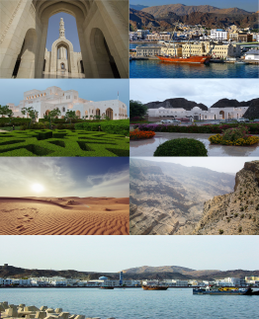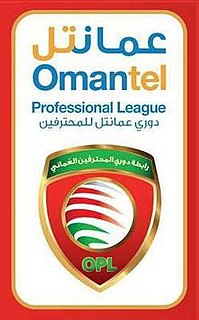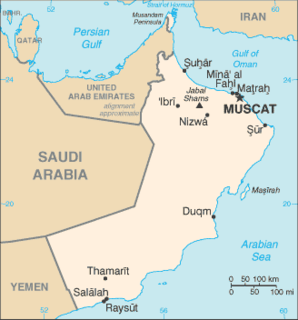
Oman, officially the Sultanate of Oman, is a country on the southeastern coast of the Arabian Peninsula in Western Asia and the oldest independent state in the Arab world. Located in a strategically important position at the mouth of the Persian Gulf, the country shares land borders with the United Arab Emirates to the northwest, Saudi Arabia to the west, and Yemen to the southwest, and shares marine borders with Iran and Pakistan. The coast is formed by the Arabian Sea on the southeast and the Gulf of Oman on the northeast. The Madha and Musandam exclaves are surrounded by the UAE on their land borders, with the Strait of Hormuz and the Gulf of Oman forming Musandam's coastal boundaries.

The Politics of Oman take place in a framework of an absolute monarchy. The Sultan of Oman is not only the head of state, but also the head of government. The head of state and government is the hereditary sultan, who appoints a cabinet to assist him. The sultan also serves as the supreme commander of the armed forces, prime minister, defense minister, finance minister and foreign affairs minister.

Muscat is the capital and is the most populated city in Oman. It is the seat of the Governorate of Muscat. According to the National Centre for Statistics and Information (NCSI), the total population of Muscat Governorate was 1.4 million as of September 2018. The metropolitan area spans approximately 3,500 km2 (1,400 sq mi) and includes six provinces called wilayat. Known since the early 1st century CE as an important trading port between the west and the east, Muscat was ruled by various indigenous tribes as well as foreign powers such as the Persians, the Portuguese Empire, the Iberian Union and the Ottoman Empire at various points in its history. A regional military power in the 18th century, Muscat's influence extended as far as East Africa and Zanzibar. As an important port-town in the Gulf of Oman, Muscat attracted foreign tradesmen and settlers such as the Persians and the Balochis. Since the ascension of Qaboos bin Said as Sultan of Oman in 1970, Muscat has experienced rapid infrastructural development that has led to the growth of a vibrant economy and a multi-ethnic society. Muscat is termed as a Beta - Global City by the Globalization and World Cities Research Network.

Said bin Taimur was the 13th Sultan of Muscat and Oman from 10 February 1932 until he was deposed on 23 July 1970 by his son Qaboos bin Said.

Qaboos bin Said Al Said was the Sultan of Oman from 23 July 1970 until his death. A fifteenth-generation descendant of the founder of the House of Al Said, he was the longest-serving leader in the Middle East and Arab world at the time of his death.

The Dhofar Governorate is the largest of the eleven Governorates in the Sultanate of Oman in terms of area. It lies in Southern Oman, on the eastern border with Yemen's Al Mahrah Governorate. It is a rather mountainous area that covers 99,300 km2 (38,300 sq mi) and has a population of 249,729 as of the 2010 census. The largest city, as well as capital of the Governorate, is Salalah. Historically, the region was a source of frankincense. The local variety of Arabic is Dhofari Arabic, which is quite distinct from that of the rest of Oman and from Yemen.

Salalah is the capital and largest city of the southern Omani governorate of Dhofar. Its population in 2009 was about 197,169.

The Dhofar Rebellion, also known as the War in Dhofar or the Omani Civil War, was waged from 1962 to 1976 in the province of Dhofar against the Sultanate of Muscat and Oman. The war began with the formation of the Dhofar Liberation Front, a group which aimed to create an independent state in Dhofar, free from the rule of the Omani Sultan Said bin Taimur. The rebels also held the broader goals of Arab nationalism which included ending British influence in the Persian Gulf region.

Dhofar Sports, Cultural and Social Club is an Omani sports club based in Salalah, Oman. The club is currently playing in the Oman Professional League, top division of Oman Football Association. Their home ground is Al-Saada Stadium, but they also recognize the older Salalah Sports Complex as their home ground. Both stadiums are government owned, but they also own their own personal stadium and sports equipment, as well as their own training facilities.

Al-Nasr Sports, Cultural and Social Club is an Omani sports club based in Salalah, Oman. The club is currently playing in the Oman Professional League, top division of Oman Football Association. Their home ground is Al-Saada Stadium, but they also recognize the older Salalah Sports Complex as their home ground. Both stadiums are government owned, but Al-Nasr S.C.S.C. also own their own personal stadium and sports equipment, as well as their own training facilities. Also Al-Nasr is famous for producing some of the greatest and most successful Omani footballers, such as Ali Al-Habsi, Hashim Saleh and Fawzi Bashir.

The Oman Professional League, previously known as the Omantel Elite League is the top division of the Oman Football Association, and was officially created in 1976. Currently the most successful team in the league is Dhofar with a total of eleven titles to their name.

This page list topics related to Oman.
Al-Ittihad Club is an Omani sports club based in Salalah, Oman. The club is currently playing in Oman First Division League, first division of Oman Football Association. Their home ground is Al-Saada Stadium, but they also recognize the older Salalah Sports Complex as their home ground. Both stadiums are government owned, but they also own their own personal stadium and sports equipment, as well as their own training facilities.

Internal Security Service transliterated:Jahaz al Amn al Dakhly, is the national security agency of the Sultanate of Oman. The agency focuses solely upon domestic security while foreign intelligence operations is specifically handled by the Palace Office, which controls external security and coordinates all intelligence and security policies.

The Sultan's Special Force (SSF) — Arabic: قوات السلطان الخاصة, transliterated:Qawat al-Sultaniya al-Khasah is a separate force branch within the Sultan's Armed Forces (SAF) and although equipped to carry out land defense operations, it is not part of the Royal Army of Oman.

The 1970 Omani coup d'état was the bloodless overthrow of Sultan of Oman Said bin Taimur by his son Qaboos bin Said in Oman on 23 July 1970. Occurring in the midst of the Dhofar Rebellion, the palace coup was executed with the support of the British and saw Sultan Said bin Taimur deposed and sent into exile to the United Kingdom. The coup was a pivotal moment in modern Omani history as Qaboos swiftly set in motion numerous wide-ranging modernization reforms in the kingdom, transforming Oman from an underdeveloped backwater into a country on par with many Western nations in terms of political stability and economic development. At the time of his death in January 2020, Sultan Qaboos was the longest serving ruler in the Middle East.

The Dhofar Mountains, also known as Al-Qara Mountains, are a mountain range in the southeastern part of the Arabian Peninsula. In a broad sense, they extend from Dhofar Governorate in Oman to Hadhramaut Governorate in Yemen, and are located between the Hajar in the northern part of Oman, and the Sarawat in the western part of Yemen. Otherwise, the range in the eastern part of Yemen, particularly near Mukalla, is referred to as the "Hadhramaut" or "Mahrat".

Hilal bin Ali bin Hilal Al-Sabti was born on October 27, 1972. He is the Executive President of Oman Medical Specialty Board (OMSB), since May 2015, under Royal Decree No. 24/2015. Hilal is a Senior Consultant Cardiothoracic Surgeon at Sultan Qaboos University Hospital (SQUH).















